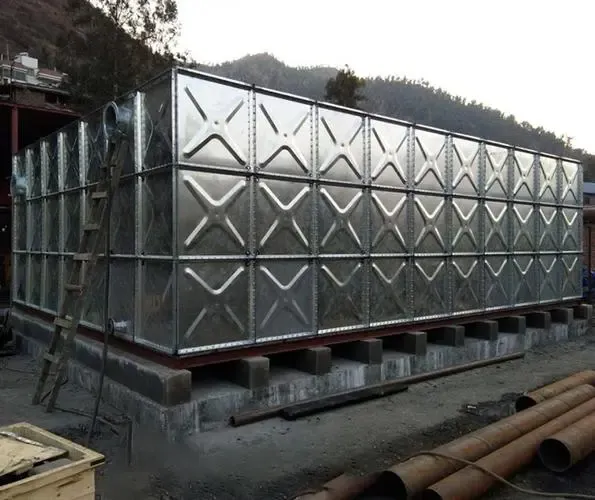loading...
- No. 9, Xingyuan South Street, Dongwaihuan Road, Zaoqiang County, Hengshui, Hebei, China
- admin@zjcomposites.com
- +86 15097380338
- Welcome to visit our website!
FRP Softener Tanks for Enhanced Water Treatment Solutions
Understanding FRP Softener Vessels A Comprehensive Guide
Fiberglass Reinforced Plastic (FRP) softener vessels have become increasingly popular in water treatment and purification processes. These vessels play a critical role in softening hard water, ensuring that it meets optimal standards for various applications in residential, industrial, and commercial settings. This article explores the advantages, functionalities, and applications of FRP softener vessels, providing valuable insights into why they are a preferred choice in today’s water management solutions.
What are FRP Softener Vessels?
FRP softener vessels are specialized containers designed to hold water softening resins that help remove hardness-causing minerals, primarily calcium and magnesium ions, from water. Constructed from fiberglass reinforced plastic, these vessels are lightweight yet strong, resistant to corrosion, and capable of withstanding high pressures and varying temperatures. Their durability and non-reactive nature make them ideal for water softening applications across diverse environments.
How Do FRP Softener Vessels Work?
The operation of FRP softener vessels revolves around a process called ion exchange. Hard water enters the vessel, where it comes into contact with negatively charged resin beads. As the water flows through, the calcium and magnesium ions present in hard water are exchanged for sodium ions from the resin beads. This process effectively transforms hard water into soft water, which is more suitable for various uses, from household chores to industrial processes.
Once the resin becomes saturated with hardness minerals, it requires regeneration. This process typically involves flushing the resin with a sodium chloride solution (brine), which replenishes the sodium ions that have been exchanged during softening. After regeneration, the vessel is rinsed, and it can begin the softening cycle once again.
Key Advantages of FRP Softener Vessels
1. Corrosion Resistance One of the standout features of FRP vessels is their resistance to corrosive agents. Unlike traditional steel or metal vessels, FRP does not rust or corrode, which ensures a longer lifespan and less maintenance. This characteristic is particularly beneficial in environments with high salinity or chemical exposure.
frp softener vessel

2. Lightweight Construction FRP vessels are significantly lighter than their metal counterparts, which simplifies installation and reduces transportation costs. Their lightweight nature also means less structural reinforcement is required in systems where weight is a concern.
3. Excellent Insulation The fiberglass material offers superior thermal insulation, which can be advantageous in maintaining temperature stability within the vessel. This helps optimize the efficiency of the ion exchange process.
4. Cost-Effective Although the initial investment in FRP softener vessels may be higher than conventional materials, their durability, reduced maintenance needs, and extended lifespan contribute to lower total lifecycle costs.
5. Adaptability FRP softener vessels can be manufactured in various shapes and sizes, allowing customization for specific applications in homes, industries, and municipal water treatment facilities.
Applications of FRP Softener Vessels
FRP softener vessels find applications in numerous sectors, including
- Residential Use Homeowners commonly use these vessels in water softening systems to enhance water quality for drinking, cooking, and washing. - Industrial Processes Many industries, such as food and beverage, textiles, and pharmaceuticals, utilize softened water to prevent scale buildup in machinery and ensure product quality. - Commercial Facilities Restaurants, hotels, and laundries benefit from softened water to improve cleaning processes and prolong the lifespan of equipment.
Conclusion
FRP softener vessels stand out as a robust and efficient solution for water softening needs. Their unique properties and advantages make them suitable for a wide range of applications, ensuring that users can enjoy the benefits of softened water without the limitations often associated with traditional materials. As industries increasingly prioritize water quality and environmental sustainability, FRP vessels will likely continue to play a pivotal role in modern water treatment practices.
-
The Rise of FRP Profiles: Strong, Lightweight, and Built to LastNewsJul.14,2025
-
SMC Panel Tanks: A Modern Water Storage Solution for All EnvironmentsNewsJul.14,2025
-
GRP Grating: A Modern Solution for Safe and Durable Access SystemsNewsJul.14,2025
-
Galvanized Steel Water Tanks: Durable, Reliable, and Ready for UseNewsJul.14,2025
-
FRP Mini Mesh Grating: The Safer, Smarter Flooring SolutionNewsJul.14,2025
-
Exploring FRP Vessels: Durable Solutions for Modern Fluid HandlingNewsJul.14,2025
-
GRP Structures: The Future of Lightweight, High-Performance EngineeringNewsJun.20,2025
